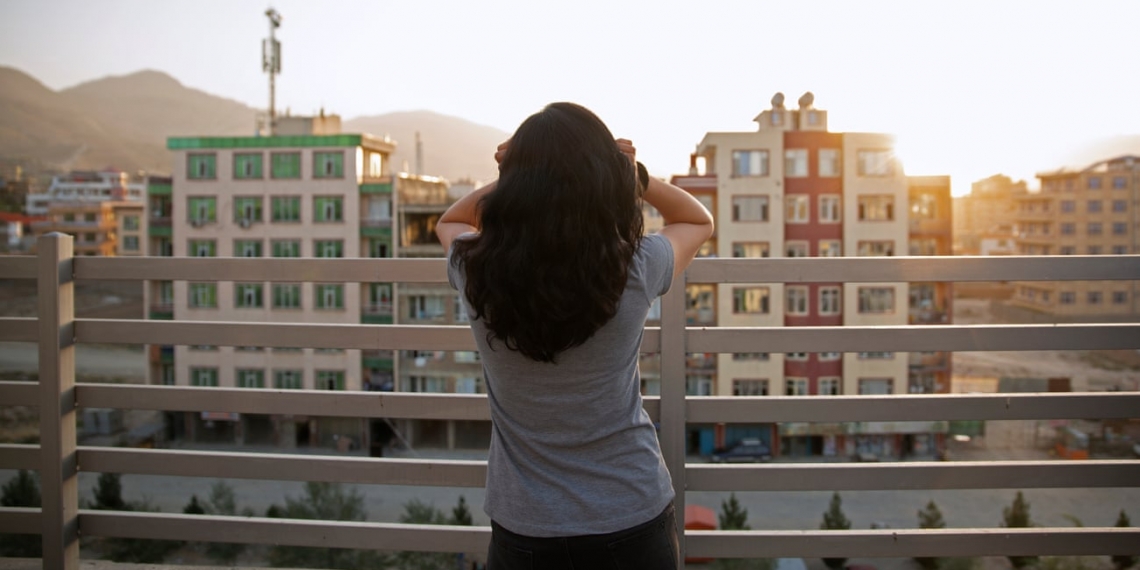ByLida Ahmadi
Published by Rukhshana Media and The Guardian
There’s an old saying in Afghanistan that encapsulates the country’s views on divorce: “A woman only leaves her father’s house in the white bridal clothes, and she can only return in the white shrouds.”
In this deeply conservative and patriarchal society, women who defy convention and seek divorce are often disowned by their families and shunned by Afghan society. Left alone, they have to fight for basic rights, such as renting an apartment, which require the involvement or guarantees of male relatives.
Despite the social stigma and barriers to independence, there are divorced women living in Afghanistan today. Women like Roqia* and Tahira*, who divorced seven and eight years ago respectively, and now share an apartment. Together, Roqia and Tahira have weathered many storms and supported each other, united by their similar experiences.
Both women were born as refugees in Iran. Roqia, 30, returned to Afghanistan in 2009 when the future of the country seemed brighter and full of hope. “When I turned 20, my family married me to a man we didn’t know very well. But it wasn’t a good match, and we divorced seven years later,” she says.
Soon after the separation, Roqia realised she was not just divorcing her husband, but also her family and community. “I was rejected. I had nothing and nowhere to go,” she says. “With my five-year-old son, I went to my father, but he was on his deathbed. I had no other men in my life to help me. My brother died a few years ago,” she says.
Men and women in Roqia’s life distanced themselves from her. “My mother and other relatives rejected me, saying that I had not heeded their advice on the divorce. They were against it, so I no longer had a place in their home,” she says.
Roqia and her son spent a cold winter in a women’s shelter in Kabul. “When I realised I couldn’t feed my child for days on end, I decided to hand him over to my husband’s family,” she says. In most divorces in Afghanistan, the custody of children over five is given to the father.
Tahira, who comes from the western city of Herat, shares a similar tale. “I was married off by my family when I was 19. But I couldn’t even live for two years with him, and I got a divorce,” she says. Soon after she was shunned by her family.
“They did not eat on the same table with me, or touch the food I made. They would tell me, ‘you are a divorced woman, and what you cook is unclean’,” she says. Eventually, tired of the emotional and mental stress, Tahira decided to leave. “It was at dawn, one day, the sun hadn’t fully risen, and I left my family with only the clothes I was wearing. I got into a taxi to Kabul and never looked back,” she says.
Now, after establishing new, independent lives in Kabul, Roqia and Tahira, and thousands more in similar situations, face another ordeal. As the Taliban tightens its grip on approaches to Kabul, they fear for their future. “If the Taliban take over Kabul, they will not allow us to live the independent lives we live today. We will not even be able to leave our homes because we don’t have mahrams [male guardians],” says Roqia.
Their fears are grounded in the horrors unfolding across the country. In many districts captured by the Taliban, new rules have already been imposed, including restrictions on women’s movement. Women are not allowed to leave the house unless in the company of a male guardian and fully covered in the traditional burqa.
The escalating violence has forced many Afghans to flee their homes, but divorced women living alone find themselves isolated, with no place to escape to.
Most terrifying, however, is the practice of forced marriages of young girls and widows to Taliban fighters. “We are very worried about the forced marriages by the Taliban. If they come for us like this, then we will end our lives. It will be the only option for us,” says Tahira.
While there are no statistics on the number of divorcees, widows and single women, there are thought to be thousands living independently across the country, particularly in the urban cities. Their fate hangs in the balance as the Taliban advance.
In Parwan province, north of Kabul, 35-year-old Sanobar* lives with her sister. Their parents died shortly after the fall of the Taliban, and their only brother was killed in a car accident 10 years ago, leaving the pair to fend for themselves.
Orphaned and alone, the two sisters were unable to go to school. “I wanted to be a doctor and serve my community. There was so much we wanted to do, but the tragedies and poverty tied us down,” Sanobar says. Living in an area where local beliefs dictate that people should not have a relationship with a family if there is no man in the house, they have been abandoned. “Our neighbours have cut off all ties. We are alone,” she adds, sadly.
Despite being shunned by their conservative community for not having a male guardian, the enterprising sisters supported themselves financially by sewing at home. Their work helped them secure a contract with the Parwan prosecutor’s office, making uniforms for the prisoners. Earning 6,000 afghanis a month (£۵۵), they were able to survive in a small, dilapidated house.
But with the Taliban inching closer to their province every day, Sanobar and her sister are extremely worried. They have already lost work in recent months as a result of the Taliban’s attacks. As the situation deteriorates, a deep sense of uncertainty hangs over them.
“We have nowhere to go, no money to spend, we cannot even afford to pay another month’s rent. Every night, the fear of the Taliban entering our house keeps us awake,” Sanobar says
*Names have been changed








